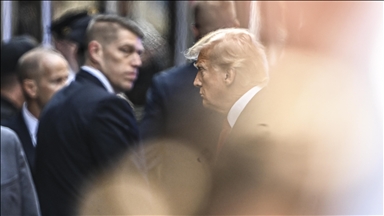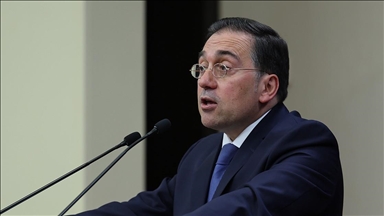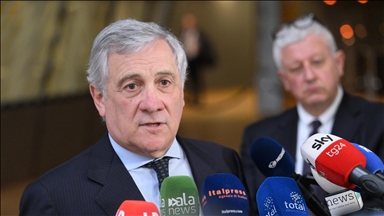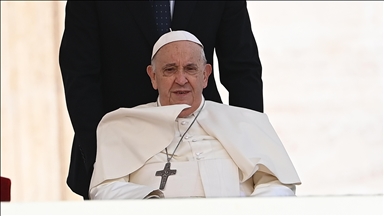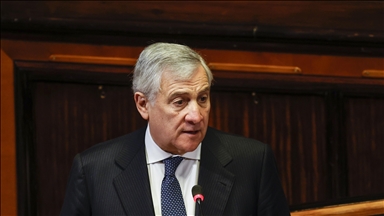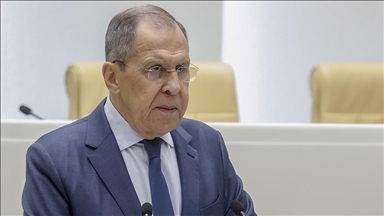Trump's Mideast dilemma: chaos or new order?
Trump and his team may continue with Obama policies albeit with different rhetoric, or take action to create a new order
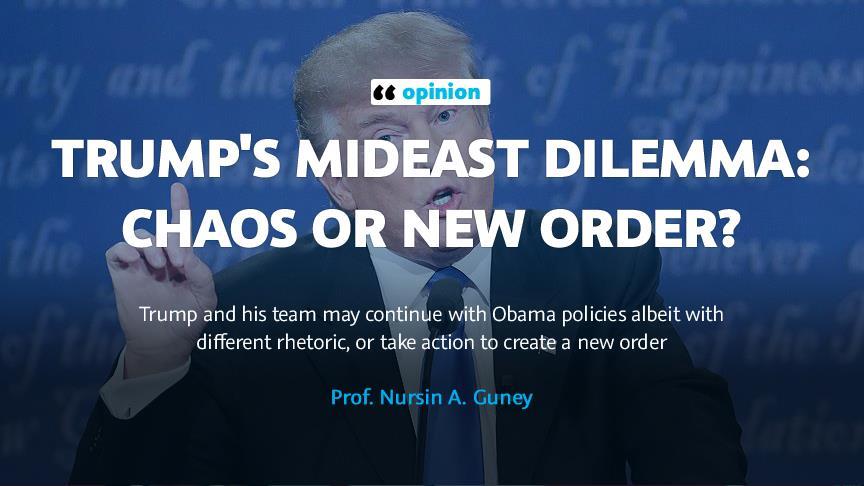

ISTANBUL
The new Middle East policy that Donald Trump, the president-elect of the United States, will follow closely concerns Turkey as well as all the other countries in the region.
With the condoning of the proxy wars in the region, which triggered fractures along sectarian and ethnic fault lines, as a result of the Obama administration's policy of handling the crisis from afar, the central governments in countries, such as Libya, Syria, Iraq and even Lebanon, have collapsed.
This policy resulted in further instability in the region, which in turn fueled terrorism and internal conflicts.
And this is exactly what President-elect Trump will inherit from Obama: a Middle East that has become a wreck.
Here is the most important question Turkey is seeking to answer: In this post-Obama wreck that is the Middle East, will Trump just continue with the policies of the Obama era through a new rhetoric or prefer to create a new order?
If Trump and his team incline more towards the creation of a new order, then the question of which particular regional powers Trump will create this order with will be of direct concern to Ankara.
Ankara is perfectly aware of the importance of these critical decisions awaiting Trump. Therefore, with Trump's election victory, a cautious atmosphere of optimism has begun to prevail in Turkey regarding the future of Ankara-Washington relations, which became remarkably strained during the Obama era and which many think would have become further strained if Clinton had been elected.
Owing to the telephone conversation between Turkish President Recep Tayyip Erdogan and Donald Trump immediately after the election and to a number of news reports saying Trump's daughter appreciated Erdogan as a political figure, public opinion in Turkey inclined more toward thinking that there would be an improvement and even a new beginning in Turkish-American relations under Trump's presidency.
However, those who know the volatile nature of Turkish-American relations are skeptical and ready to err on the side of caution and are therefore pointing out the necessity of waiting until Trump and his team give out real signs with regard to their Middle East policy.
During the time that has passed since the elections, President-elect Trump has named the members of his team step by step, but despite this certainty regarding his aides, we are still far from being able to make definitive observations and cannot discuss the next U.S. administration's Middle East policy except over a bunch of scenarios.
Conjuncture awaiting Trump team
There are many reasons for the ambivalence we are talking about. The primary reason is, the general stance and ideas of Trump's team (Flynn, Pence, Pompeo, Priebus, Sessions, Bannon and Mattis) mirror the general Republican and conservative orientation regarding domestic policy issues, but when it comes to foreign policy and security policies, it remains to be seen whether this team will adopt an approach in which deterrence is ensured by a show of power, a pragmatic approach or a neo-conservative approach.
We should remember that Eisenhower, Nixon and Reagan managed to make different policy decisions at times despite remaining within the bounds of a Republican understanding. Another question is what particular Republican foreign policies and security approaches that the prevailing bureaucratic and organizational orientation in Washington DC (or the so-called "Establishment" that we so often hear) will be able to "digest" with greater ease.
Likewise, we should also keep in mind that there are a number of primary factors that will essentially determine the future of U.S. foreign policy and what its choices regarding the Middle East might be. These are; the situation the Middle East is currently mired in, the ongoing conflicts in Iraq and Syria and the course of U.S.-Russia relations on a regional as well as global level.
Setting out from this premise, let us list the three political priorities that Trump and his team have been consistently underscoring so that we are able to discuss which particular scenarios are more likely to be realized in the future of the conflict -- which has assumed greater intensity in Iraq and Syria -- and what these scenarios are promising for Turkey.
In spite of the mixed signals Trump and his team have so far given regarding the Middle East, three particular points get constantly repeated, and the first and most stressed of these is Trump's promise to wipe out Daesh.
When promising to put an end to Daesh, Trump also points out that there will be no American boots on the ground, which signifies that his second priority is fighting terrorism without a direct U.S. intervention in the region.
The third priority is to establish cooperation with regional states. As a matter of fact, we cannot deny that these three priorities are introducing a package of compatible plans. Despite their compatibility, however, there are elements that further complicate the situation, and of these, the most important is the present political conjuncture in the Middle East.
If we push our memory a little, we remember that cooperation with regional states seemed like an instrument put on the table by the U.S. in the early years of the Obama Doctrine, which had meant a departure from the Bush administration's approach.
Moreover, this cooperation was criticized by those who prioritized democracy since such a step toward cooperation meant the maintenance of the status quo/stability with the current authoritarian leaders and dictators. In the period following 2011, when the people took to the streets, up in arms against autocracies, military rule and dictators, the United States made a very carefully thought through preference in favor of its interests, which catered to the destabilization of the region, but in any case, all of the administrations that the U.S. had habitually established ties with or opposed began to topple one by one.
In short, it will be more difficult for Trump to be on good terms with the countries in the region than it has been for Obama because today's Middle East is a multi-faceted chaos rising from the disintegration of the states there.
Trump's Middle East options
Trump and his team may cling to the formula they are familiar with in order to overcome this difficulty and may choose to prioritize and support Turkey, Israel, Egypt and Saudi Arabia, its traditional allies as well as an axis of status quo in the region once upon a time.
The actual meaning of "status quo" has, of course, undergone a radical change in the Middle East along the way, and the days when we were able to say "Ankara, Cairo, Tel Aviv and Riyadh can agree on just anything" are long gone.
We should, however, keep in mind that these regional actors are uniformly disconcerted by the rising power of the Iran-Hezbollah axis as a security problem and that there are common problems caused by terrorism. In this regard, there may as well be an agenda of the fight against terrorism that would be launched with a primary focus on Daesh.
Iran's influence rising in the Middle East -- something Trump often emphasized during his election campaign -- extending from Iraq to Yemen through sectarian wars may be counterbalanced in this manner.
The second option awaiting Trump and his team is leading us to consider some more complex possibilities. The part of Trump's policy of dealing with Daesh terrorism first that is problematic for Turkey is hidden in the rationalization of this option.
In many speeches he made, Trump kept saying that he did not know who the groups from the Free Syrian Army (FSA) that proved effective in the fight against Daesh in Syria were; groups that gained greater efficiency thanks to the Operation Euphrates Shield.
This viewpoint matches the Russian perspective on Syria, according to which anybody opposed to the Syrian regime is a terrorist.
Therefore, Trump and his team may opt to support Russia and the Syrian regime instead of the FSA, which they perceive to be militarily weak and fragmented, which means giving Aleppo to the regime.
Such a decision to be made by the new U.S. administration would be problematic for Turkey from two aspects. It would primarily mean that the FSA, which is significant also in terms of Turkey's Operation Euphrates Shield, would be trapped, and controlling an FSA, now economically and psychologically overburdened, would be considerably more difficult for Turkey, if not impossible.
Secondly, and more importantly, the fall of Aleppo would trigger a new exodus wave into Turkey. Ankara is not refraining from making all the necessary arrangements against such a possibility. First, Ankara continually underscores that the objective of Operation Euphrates Shield is not to invade Syria or Aleppo, a principle frequently stressed by President Erdogan.
This is as much a disclaimer to the FSA as it is to everybody else, but Turkey, on the other hand, has not given up the idea that the opposition forces in Syria must play a role in its future. Therefore, negotiations with Russia over a number of issues, such as opening an aid corridor in Aleppo, is meaningful and important.
Indeed, given the current point arrived at in the Turkish-Russian dialogue, we understand that Moscow will not oppose the operation being carried out with the support of Turkey as long as Operation Euphrates Shield does not interfere in the domain of Russian influence.
As the strategic dialogue between Turkey and Russia is continuing with such a hard-to-sustain balance in Al-Bab, what the U.S. preference in the face of this picture, namely, that of Russia and the regime, will be is also an important question.
Trump occasionally talked about establishing strong ties with Russia; yet it is something to get along well with Moscow, but conceding Syria to Russia while accusing the Obama administration in relation to Iran is another.
Therefore, the attitude of the Trump team towards two particular issues is not yet clear: 1) What are the limits of U.S. tolerance towards a Russia with greater ambitions and influence before it has close ties with it? That is, what is the red line of the U.S. regarding Russia? 2) Will the Democratic Union Party (PYD) / the People's Protection Units (YPG) continue to be useful instruments for the U.S.?
Scenarios awaiting Turkey
Turkey's attitude towards these two issues is clear and open: the PYD/YPG are as unacceptable as Daesh; namely, Ankara will definitely oppose any plan that envisages the use of terrorists in the fight against terrorism.
To this end, the Operation Euphrates Shield will continue in accordance with its objectives in the north of Syria.
Additionally, given that the operation is a military one being carried out on a very complex ground, the risks of the operation will be felt from time to time. For this reason, as long as the new administration of the U.S. remains undecided regarding the PYD, the Turkey-Russia dialogue and the new limits that will emerge out of this dialogue will bear importance.
There are experts pointing out that a day may come when the team that will be governing the U.S. will be uncomfortable with Russia, and hence it does not seem quite possible for the PYD option to cease to be viable all of a sudden.
They have a point; foreign policy is as much about transformations as sustainability since no actor would be willing to shelve its strategic investments overnight and admit and incur the cost of its strategic errors.
And for those who keep asking whether we will fall into the same vicious circle and whether the worst-case scenario will be constantly imposed on Turkey/always on Turkey, let us drop some hints about a positive scenario:
We are talking about a future when the U.S. military will not be physically present on the ground. In such a future, however much they desire it, neither Assad nor Iran could possibly secure the territorial integrity of Syria.
And Russia, which we view as an important force to be reckoned with due to its conventional military capacities, seems to have got what it desired in Syria by building up a presence in the Mediterranean, having captured all of the seaports.
It is not crossing Moscow's mind to win all of Syria for Assad, jeopardizing all the gains it has achieved at the expense of the military and economic hardships it is currently enduring. As for Turkey; it will remain on the ground militarily, politically and diplomatically until it guarantees a terror-free belt and the future security of such a belt.
At this point, when the nature of the rivalry goes from regional and tactical to strategic, the U.S. might possibly remember that it is actually a NATO ally on the ground, which is exactly what the Obama administration has forgotten about.
Moreover, Ankara will be constantly reminding the US that all the attempts at destabilizing Turkey, which has succeeded in Operation Euphrates Shield, have consistently failed (the PKK/Daesh terrorism, the FETO/PDY's three attempts at overthrowing the government, economic pressures etc.). As a result of all of these (occasions to remember and remind, facing up to the necessity to be both on the ground and at the table to effectively benefit from the balance of the U.S.-Russia relations), Turkey may become the guarantor of a neighboring area freed from terrorism where the necessary investments can be made for the return of the refugees.
There are indeed many issues that Trump and his team will have to consider, so many paths they can take depending on each particular scenario. However, it is said that the Trump team, which will set out with the hope of somewhat bettering relations with Ankara based on a balance of sympathy-rationality, will have to concede certain things to a Turkey which has resisted against various attacks. The thing that will be conceded may be the leadership of FETO, which is known to be as important to Ankara as the issue of the PKK. But, since it may prove difficult to take any steps solely with the initiative of the administration because of the inner workings of U.S. domestic law, perhaps the U.S. will be tilted more toward the good scenario in Syria.
Translated by Omer Colakoglu
* Opinions expressed in this piece are the author’s own and do not necessarily reflect Anadolu Agency's editorial policy.
Anadolu Agency website contains only a portion of the news stories offered to subscribers in the AA News Broadcasting System (HAS), and in summarized form. Please contact us for subscription options.


